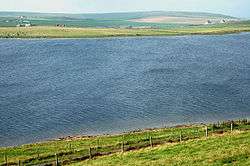Loch of Swannay
| Loch of Swannay | |
|---|---|
| Swannay loch | |
 | |
| Coordinates | 59°8′3″N 3°12′19″W / 59.13417°N 3.20528°WCoordinates: 59°8′3″N 3°12′19″W / 59.13417°N 3.20528°W[1] |
| Type | Freshwater loch |
| Primary outflows | Swannay burn [2] |
| Basin countries | Scotland |
| Max. length | 2 mi (3.2 km)[2] |
| Max. width | 0.66 mi (1.06 km)[2] |
| Surface area | 233.4 ha (0.901 sq mi)[1] |
| Average depth | 12 ft (3.7 m)[2] |
| Max. depth | 9.25 ft (2.82 m)[2] |
| Water volume | 51,000,000 cu ft (1,400,000 m3)[2] |
| Surface elevation | 43 m (141 ft)[1] |
| Islands | 3 islets [1] |
The Loch of Swannay is the most northerly loch on the mainland of Orkney and lies within the parish of Birsay in the north west of the island. It is an elliptically shaped, freshwater loch and is close to the lochs of Hundland and Boardhouse. The grassland at the shore of the loch is the main feeding area for a wintering flock of rare Greenland white-fronted geese and the rare flat-stalked pondweed is found in the waters. Many varieties of birds use and nest in the loch including mute swans, skylarks, meadow pipits, twites, gulls and sedge warblers.[3] It is also popular for trout fishing.[4]
The loch was surveyed[2] in 1906 by James Murray and later charted[5] as part of the Bathymetrical Survey of Fresh-Water Lochs of Scotland 1897-1909.[6]
References
- 1 2 3 4 "Loch of Swannay, Orkney". British Lakes. 2013. Retrieved 2013-10-26.
- 1 2 3 4 5 6 7 "Bathymetrical Survey of the Fresh-Water Lochs of Scotland, 1897-1909, Lochs of Orkney". National Library of Scotland=. Retrieved 2013-10-26.
- ↑ "Natural Heritage, Annex 1: Local Nature Conservation Sites" (PDF). Orkney Islan Council. Retrieved 2013-10-26.
- ↑ "The Lochs of Orkney". Orkney Trout Fishing Association. Retrieved 2013-10-26.
- ↑ "View: Lochs of Boardhouse, Hundland and Swannay - Bathymetrical Survey, 1897-1909 - National Library of Scotland". National Library of Scotland. Retrieved 2013-10-26.
- ↑ Murray, John; Pullar, Laurence (1910). Bathymetrical Survey of Fresh-Water Lochs of Scotland during the years 1897 to 1909: report on scientific results. Edinburgh.